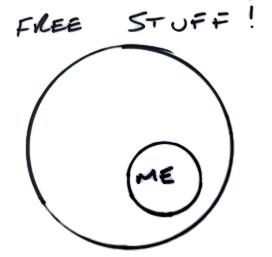The rise of the internet and social media platforms has seen the “if the product’s free, you are the product” phrase often repeated.
Its origin is attributed to several sources but the earliest instance of its use I can find dates from television advertisements in the 1970’s. The product was the audience, and they were described as being ‘delivered’ to the television advertisers.
Fast forward to today, via Tesco and their famous Clubcard, and it is now the internet and social media delivering the product (us) to advertisers. Despite our best intentions, most of us are still unable to answer the question “How much is Enough?” and advertisers spend big bucks ensuring the answer is “More than you’ve already got.”
Big Tech Data Tracking
People were genuinely shocked by the Facebook and Cambridge Analytica scandal five years ago. The fact that data was collected ‘unknowingly’ and used to generate microtargeted ads initially caused an uproar for both tech platforms and their users. But the current mood seems more accepting that this is just the way Big Tech operates and that it is the price we must pay for all the free stuff online.
I don’t have the impression much has changed since Cambridge Analytica; Facebook still seems creepily perceptive. Occasionally, I will have a more disturbing experience where I’ll have been discussing something with my wife and one of us will conveniently receive a related ‘sponsored post’ about the exact same topic on a social media platform a few hours later.
We haven’t quite reached the levels of the “Joan is Awful” episode of Black Mirror on Netflix (don’t watch it if you’re of a nervous disposition or prone to wearing a tin foil hat). But this now seems a lot less like science fiction, as evidenced by Google searches for ‘Netflix Terms and Conditions’ spiking 596% only 80 hours after its release and by 1,524% a week later (source Casino Alpha). This is a timely reminder that those terms and conditions we all scroll through quickly and accept in haste, are in fact a legal contract between you and the service provider.

Personalised Tracking
Since the launch of iOS15, Apple now asks for consent to show ‘personalised ads’ as it calls them.
Previously, it used to collect the data it needed by default (see speed reading and blindly accepting terms and conditions above). This is now managed in a more touchy-feely way by suggesting that as they are going to allow you to be bombarded with adverts anyway, they may as well be relevant to you. There isn’t a ‘no adverts option’ just the seemingly unwise choice to ‘keep less relevant ads’. Importantly, this brave new world is referred to by Tech companies as ‘personalisation’ and not ‘tracking’ or ‘stalking’.
In short, if you use a smart phone, tablet, PC, laptop etc. you are being watched and marketed to 24 hours a day, seven days a week. Even if you’re not online 24 hours a day, those sponsored posts will be waiting for you the next time you log-on. Tech companies employ armies of scientists and psychologists to relentlessly target you and influence how you spend your money and if you stop scrolling through their sites for a while, your device will be beeping, pinging, and vibrating to remind you that you urgently need to check it again for new adverts updates.
The Product is You
So, we must acknowledge what this marketing is designed for; increased impulse spending based on the perception that what you need for a fulfilled life is more “stuff.” Consumerism and cleverly timed adverts work to make you spend money on things you think you need and want. And when it comes to the mindless way people tend to engage with technology, and the immediacy of next day delivery, impulse purchases almost become a given.

The product being sold is not what you buy, it’s you. Your interests, habits, wants, community, time, attention and money.
If this seems one-sided and all a bit hopeless then don’t despair. You have the ability to take a step back from how technology encourages consumerism. They may still be able to collect a certain amount of your data but with a few checks in place, you can separate their attempts to sell you things from your actions to purchase.
Here are 5 top tips to help you stop buying stuff online that you don’t need:
The Online Quarantine
If it’s a discretionary purchase rather than an essential one, don’t buy the item straight away. Resist the temptation to ‘swipe right’ on Amazon and Buy it Now and save it in your basket for a few days to avoid an impulse purchase. Set yourself a sensible time limit of a few days (sorry, not hours) and only buy it if you really need it.
Pay Cheap Pay Twice
When you do buy stuff try to do it more mindfully. Is that cheap pair of shoes or top that only costs a fraction of a better-quality item that will last years really a bargain, or will it cost you more in the long run. Will the item wear out, fall apart, or break so you’re looking for a replacement within weeks/months or would you be better off spending more money on something well-made and better quality in the first place, that will give you years of use and enjoyment. You’ll be helping the environment and saving on landfill too.
Scroll Through Those Subscriptions
(for iPhone users it’s – General/Settings/Your Name/Subscriptions) and check how many you still use or really need. It’s easy to let these auto-renew each month but the chances are there will be some you don’t use any more. Convert that money you save into automated savings instead and immediately increase the direct debit for your regular long-term savings plan instead (Don’t have one yet? We need to talk).
Owning less stuff will reduce stress and anxiety levels and improve your mental health.
You don’t have to pare things back to Gandhi-like levels (he was rumoured to only have six possessions when he died) but the more stuff you own the more things you have to worry about and the more things that will wear out and need repairing or replacing. If you really want to push the boat out, you could try some decluttering while you’re at it too, which has the same benefit.
One in/One Out
If you really must buy that item, force yourself to get rid of (or ideally recycle or freecycle) one item you already own before you click on the Buy it Now button. It may be tough, but you’ll feel more peaceful and happier about your new purchase afterwards.
Make a List
Never go into a supermarket without a list of what you need (okay I cheated with that one and it has nothing to do with online shopping, but you can have that for free).

Need vs Want
The idea here is to try and focus on what you need as opposed to what you want but if all else fails, remember the words of Dave Ramsey, Financial Adviser and New York Times bestselling author –
“We buy things we don’t need, with money we don’t have, to impress people we don’t like”.
We’ve come a long way since those first television adverts. And the arrival of the internet, smart phones, and social media has given advertisers greater access to consumers than ever before. With a bit of mindfulness and a system to temper your purchasing impulses you can take control and fight back!
Article by David Hocking
Previous article by David which you might also enjoy: Keeping Up with the Joneses

